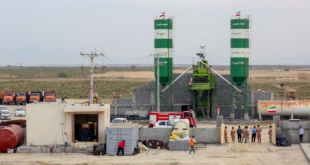Nominating a prime minister, President Maia Sandu calls for an election. Her rivals stand in the way.
Moldova’s new pro-European president, Maia Sandu, is walking a political tightrope with the nomination of her former finance minister to head the country’s next government, giving her rivals the chance to delay a snap election and work on denting her popularity in the meantime, experts say.
Elected in November, Sandu faces a parliament dominated by MPs loyal to her opponent, pro-Russian former President Igor Dodon. The Action and Solidarity Party, PAS, which Sandu led before becoming president, wants a snap election, which Dodon’s Socialists and others are determined to avoid.
Sandu’s January 27 nomination of Natalia Gavrilita as prime minister puts PAS in a bind; Gavrilita is the party’s deputy leader, but PAS has vowed not to back any new government, saying elections are a must. The Socialists, on the other hand, are hedging their bets, potentially leading to a situation in which they help elect Gavrilita to avoid a snap election they fear losing.
Angela Gramada, director of the Experts for Security and Global Affairs Association, ESGA, said Gavrilita’s potential election would put PAS in a bind.
“How will they [PAS] support their own prime minister, whom they didn’t vote for?” she asked.
“It is a unique situation in which political actors demonstrate that they cannot raise the level of political debate, do not think about the needs of the country or correctly evaluate their parties’ internal situations,” Gramada told BIRN.
Dodon: ‘It’s a circus’
Under the Moldovan constitution, an early parliamentary election is triggered if parliament twice fails to endorse a new government within 45 days of the first request or if parliament fails to pass any laws for three months.
In nominating Gavrilita, the new president turned to a trusted ally who served as finance minister in a short-lived government led by Sandu in 2019, saying she would focus on economic development and the fight against corruption.
But in the same breath, Sandu said she believed an early parliamentary election to be “the only way out of the political stalemate in which we find ourselves.”
Gavrilita accepted the nomination, but her party, PAS, said it would not back her, or any nominee.
“Only in this way will it be possible to trigger the early election that the people are waiting for,” the party said in a statement. “The problem of this country is not the government, no matter how professional it is; the problem of this country is the most corrupt parliament in the country’s history, which will not let this government work.”
Dodon, however, praised Gavrilita as an economist, while stopping short of saying whether she would get the backing of his Socialist Party, PSRM – the largest single party in parliament – or not.
“It’s a circus,” Dodon wrote on his blog on January 29. “Natalia Gavrilita is a vice president of PAS. What does this mean? You propose it, you say it’s good, but you don’t vote for it. Why?”
A day later, PSRM deputy Vlad Batrincea told a political talkshow his party would judge Gavrilita on her programme.
“Even if Maia Sandu publicly launched the call not to vote for this government, we believe that Ms Gavrilita needs to come up with a professional programme and to try, at least, to convince parliament,” Batrincea said.
A confidence vote on Gavrilita’s cabinet is expected next week. Only PAS and the Truth Platform Party, PPDA, have said explicitly that they will not back her. The others are mulling their options, knowing that not all will get back into parliament in a snap election.
If PSRM “cheats” to avoid an early election by backing Gavrilita, “we will assume the act of governing,” said PAS deputy Igor Grosu. “But that will lead to a snap election anyway,” he said, given the likelihood that the new cabinet would quickly resign.
“The solution is to clean up parliament,” he said. “Any minority government is in the hands of the undeclared PSRM-Shor coalition,” Grosu warned, in reference to the small ‘For Moldova’ bloc led by Ilan Shor, the fugitive mastermind behind the 2014 theft of $1 billion from the Moldovan banking system.
PAS polling first in snap election
Ion Tabarta, a political analyst at the Chisinau-based NGO IDIS ‘Viitorul’, said Sandu should have moved earlier, after the resignation of Prime Minister Ion Chicu on December 28, and nominated someone whom the Socialists would have a harder time voting for.
As things stand, “Gavrilita is associated with PAS, and it fits perfectly with the media campaign launched by the Socialists to lower Maia Sandu’s rating,” Tabarta told BIRN.
“They [the Socialists] need a government to vote for and then to criticise and strike at Maia Sandu through the prime minister. The aim is to reduce Mrs Sandu’s rating and implicitly that of PAS before early elections.”
According to the results of a survey published in mid-December by pollster iData, only four parties can expect to enter parliament in the next election – PAS, PSRM, Ilan Shor Party and Our Party led by anti-establishment populist Renato Usatii.
PAS would win, though with 10 seats short of a majority, and the Socialists would come second.
Meanwhile, For Moldova has also thrown its hat into the ring, volunteering to lead a “provisional government” to, it says, stabilise the economy and roll out COVID-19 vaccines.
But ESGA director Gramada said Dodon would prefer “any nominee from the PAS” at the helm of a weak administration that would struggle to govern.
“We must pay attention to Dodon’s words, rebuking those who voted with Maia Sandu,” Gramada told BIRN. “This message is, ‘You voted with Maia Sandu, now live with the consequences’.”
 Eurasia Press & News
Eurasia Press & News



